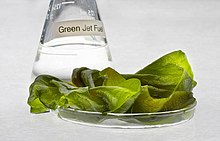
Back وقود طحلبي Arabic Biocombustible d'algues Catalan Algenkraftstoff German Biocombustible de algas Spanish Alga erregai Basque سوخت جلبک Persian Algocarburant French Combustíbel de algas Galician शैवाल ईंधन Hindi Biogorivo proizvedeno od alga Croatian

Algae fuel, algal biofuel, or algal oil is an alternative to liquid fossil fuels that uses algae as its source of energy-rich oils. Also, algae fuels are an alternative to commonly known biofuel sources, such as corn and sugarcane.[1][2] When made from seaweed (macroalgae) it can be known as seaweed fuel or seaweed oil.
In December 2022, ExxonMobil, the last large oil company to invest in algae biofuels, ended its research funding.[3]
Algal fuels boast high yields, a high ignition point, and can be cultivated with minimal impact on freshwater resources.[4][circular reference]
- ^ Scott, S. A.; Davey, M. P.; Dennis, J. S.; Horst, I.; Howe, C. J.; Lea-Smith, D. J.; Smith, A. G. (2010). "Biodiesel from algae: Challenges and prospects". Current Opinion in Biotechnology. 21 (3): 277–286. doi:10.1016/j.copbio.2010.03.005. PMID 20399634.
- ^ Darzins, Al; Pienkos, Philip; Edye, Les (2010). Current status and potential for algal biofuels production (PDF). IEA Bioenergy Task 39.
- ^ Westervelt, Amy (17 March 2023). "Big oil firms touted algae as climate solution. Now all have pulled funding". The Guardian. ISSN 0261-3077. Retrieved 21 March 2023.
- ^ "View source for Biofuel - Wikipedia". en.wikipedia.org. Retrieved 30 March 2024.
© MMXXIII Rich X Search. We shall prevail. All rights reserved. Rich X Search